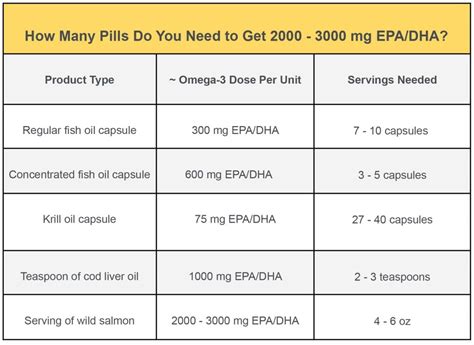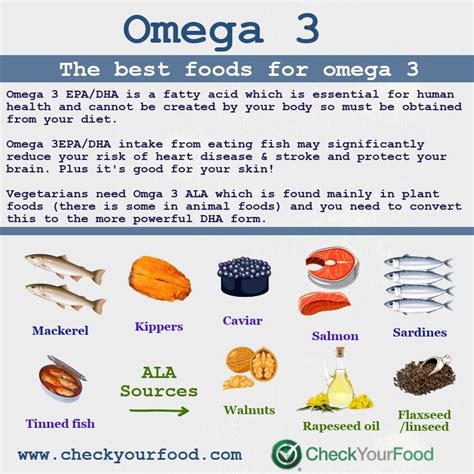omega 3 daily intake Omega-3 fatty acids are essential for good health. Try to get them from your diet by eating fish — broiled or baked, not fried. Fish oil supplements might be helpful if you have . Main: 100% Cotton. Shop AllSaints Underground oversized t-shirt in black at ASOS. Order now with multiple payment and delivery options, including free and unlimited next day delivery (Ts&Cs apply).
0 · what happens when you take omega 3
1 · maximum omega 3 per day
2 · maximum dosage of fish oil per day
3 · how much omega 3 should i take daily
4 · how many 1000mg fish oil pills should i take a day
5 · foods high in omega 3 fatty acids
6 · fish oil recommendations for seniors
7 · can i get too much omega 3
$510.00
Omega-3 Dosages for Adults. The amount of omega-3 fatty acids you need daily depends on age, gender, and omega-3 fatty acid levels in your body. Here's the optimal daily dosage in grams (g) for various age groups and .

Consumption of DHA and EPA from foods contributes a very small amount to total daily omega-3 intakes (about 40 mg in children and teens and about 90 mg in adults) . Use of dietary . Omega-3 fatty acids are essential for good health. Try to get them from your diet by eating fish — broiled or baked, not fried. Fish oil supplements might be helpful if you have . This article explores the recommended daily intake of omega-3s for adults and children and the different sources of omega-3s. It also discusses the benefits and risks of incorporating omega-3s into your diet. Recommended Dosages. There is no set recommendation on the amount of fish oil you should take. However, there are recommendations for total omega-3 intake, as well as EPA and DHA. The reference.
There are no official standards for daily omega-3 intake, but various organizations offer guidelines. Most experts recommend an intake of 250–300 milligrams per day ( 37 ).The three main omega-3 fatty acids are alpha-linolenic acid (ALA), eicosapentaenoic acid (EPA), and docosahexaenoic acid (DHA). ALA is found mainly in plant oils such as flaxseed, .
Eicosapentaenoic Acid (EPA) and Docosahexaenoic Acid (DHA) EPA and DHA are primarily found in marine sources. Fatty fish such as salmon, mackerel, sardines, and . The Dietary Guidelines for Americans 2015-2020 recommends 450-500 milligrams of omega-3 fatty acids per day (2,3). Those with coronary heart disease should consume 1 gram of omega-3 fatty acid per day, .
Omega-3 fatty acids are essential nutrients that play a crucial role in maintaining overall health. Known for their anti-inflammatory properties and significant health benefits, Omega-3s are vital for cardiovascular, brain, and eye health, among other functions.This article aims to provide expert recommendations on the daily intake of Omega-3 fatty acids to help .
Choose a supplement that provides you with the same daily amount provided by eating one to two portions of fish per week (about 450mg EPA and DHA per daily adult dose) . Increase intake of omega-3 fats; Eat more fish and from .For people with heart disease, the American Heart Association (AHA) recommends 1000 mg daily of EPA and DHA, preferably from fish, but supplements can be considered in consultation with a physician. . There is no question that many Americans could benefit from increasing their intake of omega-3 fats, but there is also evidence that omega-6 . What are omega-3 fatty acids? Omega-3 fatty acids are a type of fat that are important to human health. These fatty acids are found mostly in fish and plant oils (1). There are 3 main types of Omega-3 fatty acids: a-linolenic acid (ALA), eicosapentaenoic acid (EPA), and docosahexaenoic acid (DHA) (2). Consumption of omega-3 fatty acids is an .
(For more information about omega-3 benefits, refer to “An Introduction to Omega-3 Fats”.) In sum, the intake of fatty acids influences many aspects of health because of their diverse roles as structural lipids in every cell and as signaling precursors throughout the body. 12 . and efficient way to meet your daily needs. Omega-3 blood . The FDA recommends that daily intake not exceed 3 g/d of EPA and DHA combined, with no more than 2 g/d deriving from supplements. . Rice J, Koehler K, Vulcain T, Wu T, Koch A, Sharma S, Kolahdooz F, Bose S, Hanson C, Romero K, Diette G, Hansel NN. Omega-3 and Omega-6 Intake Modifies Asthma Severity and Response to Indoor Air .The omega-3 fatty acids that are most important to our health are: Alpha-linolenic acid (ALA), which is in some nuts and seeds and the oils made from them. . Too much vitamin A can increase the risk of osteoporosis. A maximum daily total of 1.5mg is recommended. What about omega-6 and omega-9? The optimal daily intake of omega‐3 fatty acid for blood pressure control appears to be 3 g. What Are the Clinical Implications? An optimal dose of omega‐3 fatty acids is potentially needed for blood pressure control in the general population, but individuals who are at high risk of developing cardiovascular diseases may benefit from higher .
Here's the deal: There is an established daily nutritional requirement (aka adequate intake or "AI") for ALA, the omega-3 you'll find in plant sources like flaxseed, chia seeds, soy, and walnuts. The AI for ALA is 1,100 milligrams per day for adult women and 1,600 milligrams for men each day. Omega-3 fatty acids – found in seafood, nuts and plant oils – may help improve heart and brain health, but most people aren't getting enough. . with average intake about 0.1 gram per day. U.S. health agencies offer no guidelines for how much EPA and DHA a person should include in their daily diet. However, there are recommendations for . Omega-3 intake may decrease the risk of some types of cancer, including colon, prostate, and breast cancer. However, more research is needed. 12. Could reduce asthma in children. The National Institutes of Health suggests consuming 1.1-1.6 grams of omega-3 fatty acids a day, while the American Heart Association recommends eating two servings of fish (3-4 ounces) a week as part of a heart-healthy diet. It takes about 4-5 ounces of Atlantic salmon to provide 3 grams of omega-3 fatty acids.
Fatty fish is also a good source of omega-3 fatty acids, which are good for your heart. Regularly eating fish and seafood is consistently associated with a lower risk for cardiovascular disease. The American Heart Association recommends a dietary . There are three main types of omega-3s: Eicosapentaenoic acid (EPA): found in fish Docosahexaenoic acid (DHA): also in fish Alpha-linolenic acid (ALA): in plant foods Omega-3 Fatty Acids Benefits
**DG = “Tentative Dietary Goal for Preventing Lifestyle-related Diseases” and is a value unique to Japan. For the DG amounts “it is desirable to intake more than 1,000 mg per day of EPA and DHA” (at least 1,000 mg EPA . Some research indicates that consuming omega-3 supplements with 250 mg to 500 mg of EPA and DHA daily is enough to help you reap the general health benefits of omega-3s. Still, until a target blood level of omega . There’s no official daily recommended omega-3 level, but most healthcare organisations suggest healthy adults get about 500mg of DHA and EPA combined. A healthy, balanced diet should include at least two portions . Yet, most people fall way short. According to the National Institutes of Health, on average, adults consume only 90 to 110 of the daily 250 milligrams of omega-3s that have been shown to protect against death from heart disease.Of course, you could easily get this from a couple of servings of fatty fish each week. But for most, that's not happening, per the USDA's .

This table shows the recommended daily amounts by age and sex: Age: ALA intake in grams (g) Below 12 months old . Some studies have shown that a high omega-3 intake can reduce the risk of .
what happens when you take omega 3
Omega-3 blood testing can provide valuable insights into an individual's omega-3 status and help determine if the current omega-3 intake is sufficient. This testing measures the levels of EPA and DHA in the blood, providing important numbers to . Many health organizations have released their own guidelines for omega-3 intake. Most generally range between 250–500 milligrams of combined EPA and DHA daily. However, taking higher amounts up to 5,000 milligrams daily has been shown to be safe with minimal risk of adverse side effects.
If you choose to top up on Omega 3s by using an over-the-counter fish oil or Omega 3 supplement, follow these golden rules. Don’t choose fish liver oils, they contain less Omega 3 than fish oils and too much vitamin A. Go for a supplement with lower levels of vitamin A – less than 1mg per day (which might be written as 1000ug or 1000mcg). Cognitive decline: Eating more than 1 g of omega-3 food sources daily lowers the risk of cognitive decline by 9%. Notably, DHA has a significant effect on cognitive decline. . Zhou N, et al. Omega-3 polyunsaturated fatty acids intake and blood pressure: a dose-response meta-analysis of randomized controlled trials. J Am Heart Assoc. 2022;11 .achieve the recommended daily level of marine-sourced omega-3. Our recommendations for plant-sourced omega-3s (ALA) remains; we have adjusted the amount to . 2007 and 2013, and provides guidance to health professionals on dietary intake of fish and omega-3 long-chain polyunsaturated fatty acid (LCPUFA) supplements for
Consumption of DHA and EPA from foods contributes a very small amount to total daily omega-3 intakes (about 40 mg in children and teens and about 90 mg in adults) . Use of dietary supplements containing omega-3s also contributes to total omega-3 intakes. . Ibiebele TI, Nagle CM, Bain CJ, b PM. Intake of omega-3 and omega-6 fatty acids and .
A healthy, balanced diet should include at least 2 portions of fish a week, including 1 of oily fish. That's because fish and shellfish are good sources of many vitamins and minerals.Oily fish – such as salmon and sardines – is also particularly high in long-chain omega-3 fatty acids, which can help to keep your heart healthy. Learn how omega-3 fatty acids in fish can benefit heart health. . Wang Y, et al. Dietary fish and omega-3 polyunsaturated fatty acids intake and cancer survival: A systematic review and meta-analysis. . Daily aspirin therapy; Dizziness; Don't get tricked by these 3 heart-health myths; Echocardiogram;

dolce gabbana suit

Allure Eau de Parfum by Chanel is a Amber Vanilla fragrance for women. Allure Eau de Parfum was launched in 1999. The nose behind this fragrance is Jacques Polge. Chanel describes Allure as: "Difficult to define, impossible to resist. Clean and sheer, warm and sexy, ALLURE is a floral, fresh Amber fragrance that finds an expression unique to .
omega 3 daily intake|how many 1000mg fish oil pills should i take a day



























